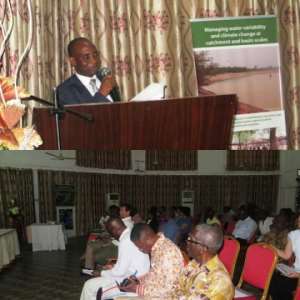
Accra, Sept 22, GNA - Dr Sugri Banbangi, Deputy Minister of Food and Agriculture, has launched a book entitled 'The Volta River Basin (VRB): Water for Food, Economic Growth and Environment' in Accra.
The book examines from a multidisciplinary and multi-stakeholder perspective, the solutions and strategies to improve the use of water and other natural resources in the VRB to achieve enhanced food security, livelihood and economic growth.
The VRB is an important transboundary basin in West Africa, which covers approximately 410,000 square kilometres across six countries: Ghana, Togo, Benin, Burkina Faso, the Ivory Coast and Mali.
Its natural resources sustain the livelihoods of its population and contribute to socioeconomic development.
The 281-page book, was authored by 39 writers, provides a comprehensive, interdisciplinary review and assessment of the issues and challenges faced.
It was edited by Dr Timothy O. Williams, International Water Management Institute (IWMI) Africa Director; Dr Marloes L. Mul, a Senior Researcher in Hydrology and Water Resources, IWMI Africa; Dr Charles A. Biney, Acting Executive Director, Volta Basin Authority, based in Ouagadougou; and Dr Vladimir Smakhtin, former Head of the Water Availability, Risk and Resilience Research Department, IWMI, Colomobo, Sri Lanka.
The authors provide a science-based assessment of current and future scenarios of water availability, the demands of key sectors, including agriculture and hydropower, and the environment under changing demographic, economic, social and climatic conditions.
They also identified solutions and strategies that would allow available water resources to be sustainably used to improve agricultural productivity, food security and economic growth in the VRB.
The book launch took placed in Accra, at a roundtable on 'Agricultural Water Management for Attainment of Sustainable Development Goals (SDGs) in Ghana', which forms part of the IWMI-Council for Scientific and Industrial Research (CSIR) Knowledge sharing series events.
Dr Banbangi said the book launch had come at an opportune time, since it was one more step that would support government efforts to make water available for productive use by Ghanaians and by so doing help Ghana meet the water-related SDGs of the development community.
He noted that challenges in Ghana's agricultural water management became more topical in recent years by the emergence of the paradigm on SDGs.
'Boosting production in the agricultural sector which directly and indirectly employs about 60 per cent of Ghanaians through various linkages is key in achieving the first three SDGs namely; no poverty, zero hunger and good health and well-being,' he said.
'It is for this reason that government has embarked on a programme to restructure and modernise the irrigation sub-sector of Ghana,' he added.
He said the reforms in the irrigation subsector hinges on four pillars: Institutional and Policy Reforms, Water Resource Management Reforms, Irrigation Service Delivery Reforms and Improving Water Use Efficiency and On-farm Productivity.
He said the strategy of government was to complement the restructuring of the irrigation sub-sector with its flagship programme 'One-Village, One-Dam'
Dr Banbangi said the main purpose of the programme was to make water readily available in as many communities as possible through the construction of irrigation and related infrastructure to facilitate all-year-round agricultural production.
The Deputy Minister said the programme would be extended to the Coastal Savannah and the cocoa growing areas for the forest zone in addition to the northern savannah zone.
Dr Victor Kwame Agyeman, the Director-General, CSIR, in a speech read on his behalf said agriculture was currently the largest user of water resources and going forward, it was important to ensure an efficient water use in the agricultural sector so as to make water available for other sectors that were also expected to contribute to the achievement of the SDGs.
Dr Williams, who gave an overview of the book, said the book was the result of a truly collaborative effort between researchers, senior policy advisors and administrators, who had spent many years working to improve water availability, use and management as a means of enhancing social, economic and environmental conditions in the Volta Basin.
He said serious thinking needs to go into how the resources of the Volta Basin were being managed; adding that '13 years from now, there will be serious competition for the available water'.
GNA
By Iddi Yire, GNA




 Akufo-Addo commissions Phase II of Kaleo solar power plant
Akufo-Addo commissions Phase II of Kaleo solar power plant
 NDC panics over Bawumia’s visit to Pope Francis
NDC panics over Bawumia’s visit to Pope Francis
 EC blasts Mahama over “false” claims on recruitment of Returning Officers
EC blasts Mahama over “false” claims on recruitment of Returning Officers
 Lands Minister gives ultimatum to Future Global Resources to revamp Prestea/Bogo...
Lands Minister gives ultimatum to Future Global Resources to revamp Prestea/Bogo...
 Wa Naa appeals to Akufo-Addo to audit state lands in Wa
Wa Naa appeals to Akufo-Addo to audit state lands in Wa
 Prof Opoku-Agyemang misunderstood Bawumia’s ‘driver mate’ analogy – Miracles Abo...
Prof Opoku-Agyemang misunderstood Bawumia’s ‘driver mate’ analogy – Miracles Abo...
 EU confident Ghana will not sign Anti-LGBTQI Bill
EU confident Ghana will not sign Anti-LGBTQI Bill
 Suspend implementation of Planting for Food and Jobs for 2024 - Stakeholders
Suspend implementation of Planting for Food and Jobs for 2024 - Stakeholders
 Tema West Municipal Assembly gets Ghana's First Female Aircraft Marshaller as ne...
Tema West Municipal Assembly gets Ghana's First Female Aircraft Marshaller as ne...
 Dumsor is affecting us double, release timetable – Disability Federation to ECG
Dumsor is affecting us double, release timetable – Disability Federation to ECG
